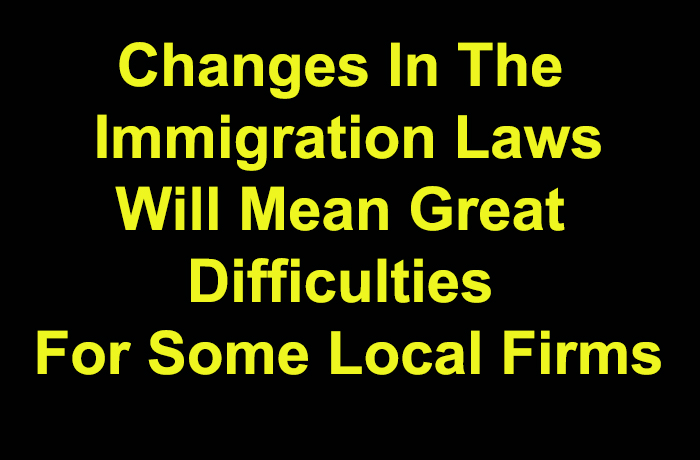The Tory government is intending to shake up the employment market from 1st January 2021 and highly regulate the number of foreign workers coming into the UK. From that date, there will be a sharp decline particularly in low and unskilled labour being allowed to work without a visa in a post-EU UK.
At present the government is asking businesses to innovate, automate, and do whatever is necessary to reduce the dependency of low skilled foreign labour which is currently showing around 17% of the food sectors.

Whether it is a foreign worker currently processing vegetables in a food business, or someone working if a food processing factory in a fish or agricultural based product, it seems a major shakeup is going to unfold. And many businesses largely dependent on cheap foreign labour will not be able to adapt quickly enough to the changing labour supply as the government digs its heels in deeply determined to make a quantum shift. (A recent study by Delloitte indicated that 46% of foreign workers were considering leaving the UK within five years.)
Prospective workers wishing to come to the UK will need to score 70 points on a system that favours highly skilled workers such as doctors, nurses and engineers and blocks low skilled workers. Many businesses across the UK in the food and non-food sectors have relied on this low skilled labour supply to keep their businesses operating.
The message to employers from Home Secretary Priti Pratel is for firms to do whatever they can to break their dependency on non-UK based labour.
Responding to the announcement of the new immigration policy, Alliance Councillor Patrick Brown said: “Many foreign migrant fishermen and fish processing workers and those workers operatiing in the agri-food processing industry generally voted for Brexit in good faith, yet they are the ones now being used by this Westminster government as a bargaining chip to save the London financial sector.

Whilst myself, and the Alliance party, did not support the decision to Leave the EU, I am worried that the people in these industries are now being betrayed.
“The Prime Minister’s immigration plan has a lot of unanswered questions, but there is a real concern that a lack of planned investment and organisation will leave Parliament with little time to scrutinise any legislation and businesses will be left in the lurch.
“Those deemed as ‘low skilled’ workers are vital to sustain businesses in the fishing and food production industries, across this District and UK-wide. They are essential for day-to-day operation and economic growth, so it is a concerning time for both those workers and their employers. It is therefore crucial that the Government offers an adjustment period for the new immigration plan, or else risk severe detrimental effects that will ultimately be felt by all of us.”
***
Reacting to the Home Office publication of their Immigration Plan, Retail NI Chief Executive Glyn Roberts said: “Retail NI has concerns that these plans do not go far enough for our local retail, wholesale and hospitality sectors. It is clear that the UK Government is not listening to the repeated concerns expressed by the business community in Northern Ireland.
“EU nationals make a significant and welcome contribution right across our supply chain, with production, wholesaling and retail. The proposed salary threshold will have a hugely negative impact on all of these key industries.
“Northern Ireland has a unique position given the border and the UK Government cannot simply adopt a ‘one size fits all’ approach.
“We would urge the Economy Minister to make immediate representation to the UK Government to change these ill thought out plans.”
UFU raises concerns regarding points-based immigration system and seasonal agricultural workers scheme.
The Ulster Farmers’ Union (UFU) says it has several concerns relating to the points-based immigration system that has been announced by the UK Government and the seasonal agricultural workers scheme.
Commenting following the release of the new immigration policy, UFU deputy president David Brown said: “Northern Ireland’s (NI) agri-food processing sector is already finding it difficult to maintain labour all year round and in addition to this, securing access to temporary workers going forward may also be challenging. There are a number of elements within the points-based immigration system that are not very clear, and we would need also need further clarification on the specific matter of seasonal workers.
“The agri-food industry in NI must be able to retain access to non-UK labour and given the border with the Republic of Ireland (ROI), it should be treated differently to other parts of the UK. In excess 60 – 70 percent of those working in our agri-food processing sectors are EU citizens. If free movement of workers is not allowed, it will undermine the position of our processors and our wider industry who will not be able to compete with their counterparts south of the border.”
The Government’s announcement will also have specific severe consequences for the NI horticulture industry. Both growing and processing are highly dependent on access to non-UK labour.
“The points-based immigration system has the potential to bring huge ramifications for both the growing and processing horticulture sectors. The feared outcome could shift production from NI. The implications of which will create a greater dependency on imports and will have serious environmental implications, especially for crops that are traditionally grown here,” said Mr Brown.
The UFU have already raised this issue with the NI Assembly Agriculture Committee and will continue to monitor and review the new immigration policy on behalf of members and the wider industry.
***
The unfolding situation is fragile as there is currently a lack of clear detail as to how businesses can adapt in this short run in to the new system. For example, foreign fishermen, deemed low skilled, may want to come to the UK to work on a contract and therefore may not in theory be subject to the £25,600 threshhold of an annual salary as indicated in the points system.


























